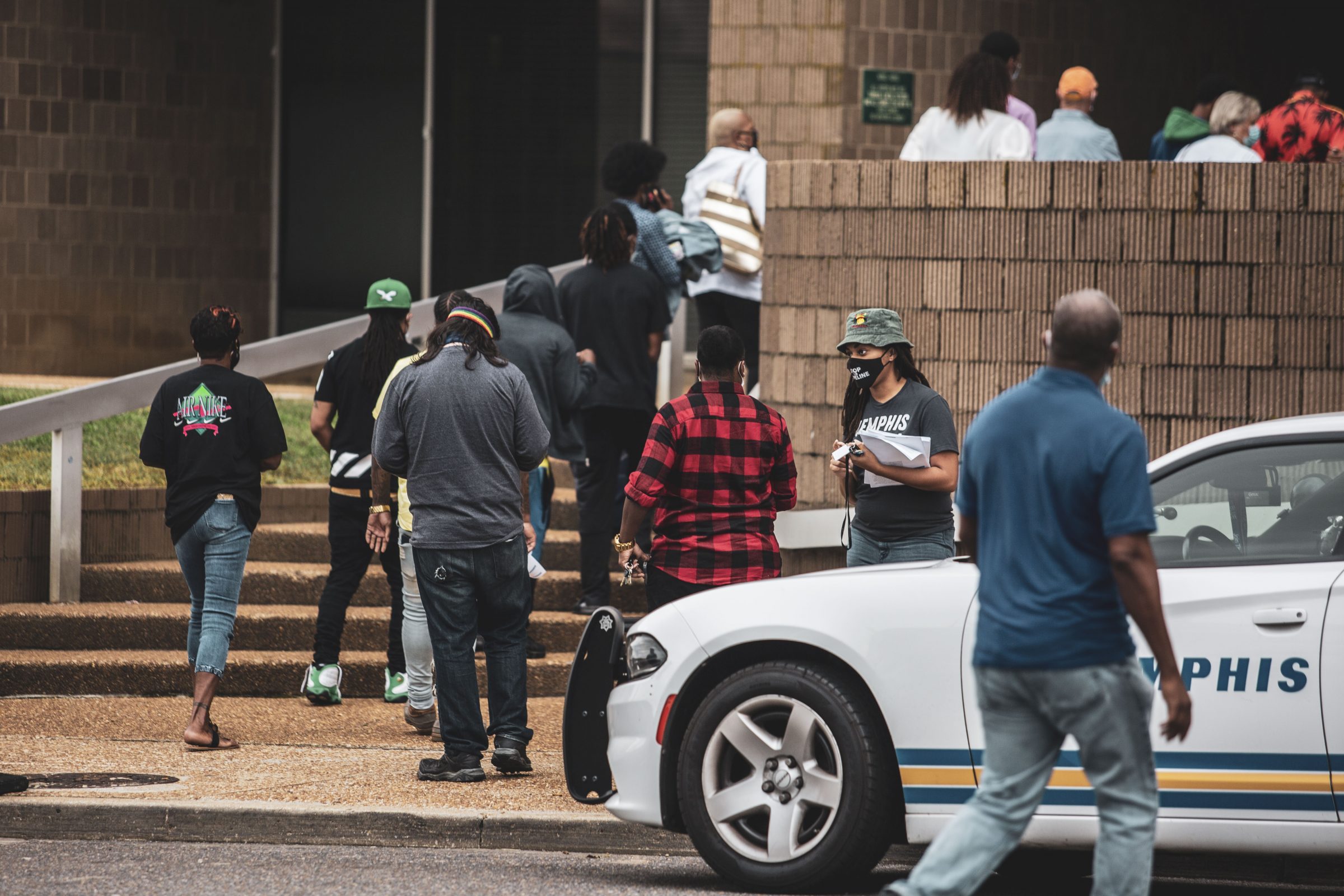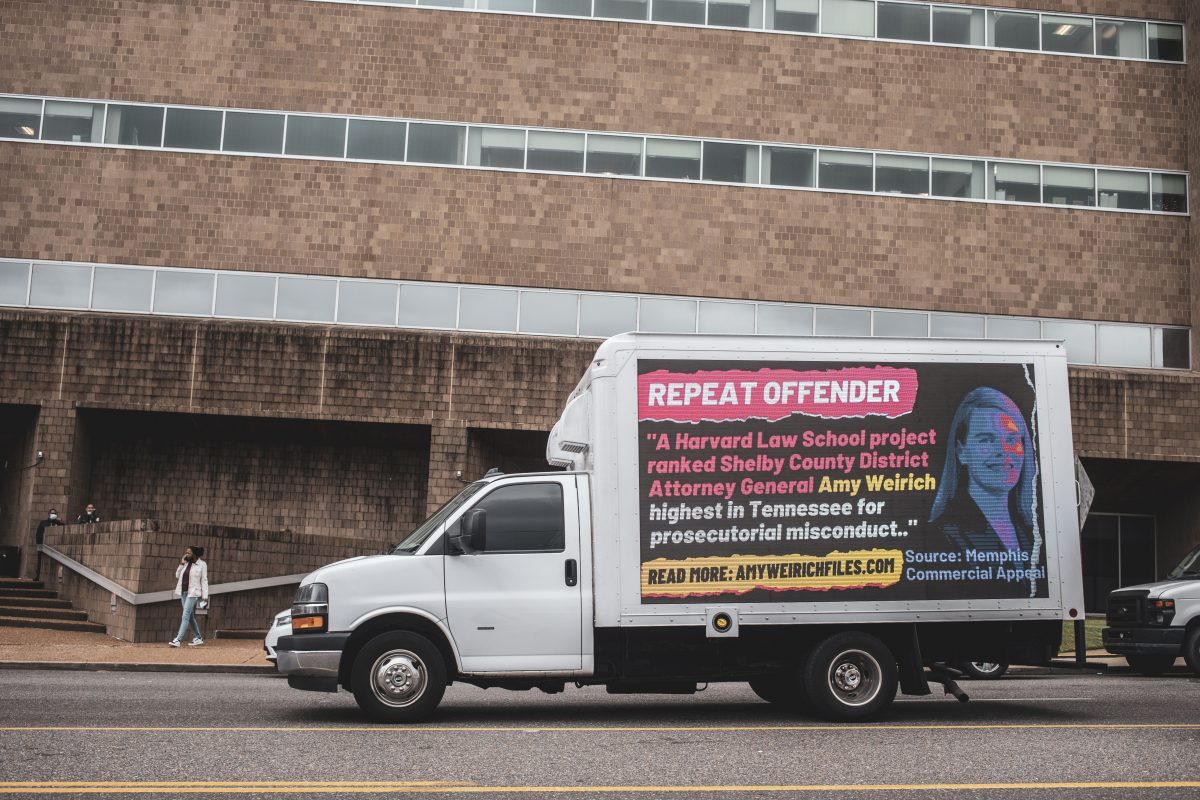This story is co-published with MLK50: Justice Through Journalism, a nonprofit Memphis newsroom focused on poverty, power and public policy — issues about which Dr. Martin Luther King Jr. cared deeply. Find more stories like this at MLK50.com. Subscribe to their newsletter here.
With 10 months before voters choose the next Shelby County District Attorney, the push to unseat Republican incumbent Amy Weirich heated up Wednesday with the launch of what organizers call a public education campaign about the prosecutor’s controversial record.
A handful of canvassers handed fliers to the dozens queuing to get inside the Shelby County Criminal Justice Center on Poplar Wednesday morning, as a mobile digital billboard labeling Weirich a “Repeat Offender” circled the center. The campaign is coordinated by Memphis Watch, a newly formed organization that doesn’t have a web presence and does not appear to be led by Memphians.
One of the billboard panels reads: The Tennessee Supreme Court on Shelby County District Attorney General Amy Weirich’s behavior in a murder prosecution: “Flagrant violation,” “off limits to any conscientious prosecutor,” “not at all clear why any prosecutor would venture into this forbidden territory.” The partial quotes were taken from a 2014 Tennessee Supreme Court ruling that excoriated Weirich for her conduct during the 2009 high-profile murder trial of Noura Jackson. The court would later vacate Jackson’s conviction; she was released after spending 11 years in prison.
The billboard’s messages are a condensed version of AmyWeirichFiles.com, which offers a blistering assessment of Weirich’s actions, some of which have drawn intense scrutiny, criticism and in one instance, a reprimand from the Tennessee Board of Professional Responsibility days before she was to face an examination of her behavior during Jackson’s trial.
Across the country, advocacy organizations and activists are calling for prosecutorial reform, a movement that’s gotten a boost from philanthropists including George Soros, who has spent millions on district attorney races in recent years in an effort to reimagine the country’s criminal justice system.
The campaign comes at the same time that Memphis is experiencing a surge in gun crime, including Sunday’s off-campus killing of a Rhodes College student and last month’s Collierville Kroger shooting that left the shooter and a victim dead and more than a dozen others injured. These incidents and the resulting flurry of news coverage may make residents more receptive to Weirich’s tough-on-crime stance; research has shown that media coverage of crime can lead to increased public support for punitive criminal justice policy.
Outside the justice center Wednesday morning, canvasser Victoria Terry with the progressive nonprofit Memphis For All shared specific criticism about Weirich’s record with passersby.
“When she should do DNA testing, she doesn’t,” Terry said. “She tries kids as adults all the time.”
“There’s another election coming up. So we’re doing everything we can to put somebody better in office, someone who actually cares about our community.”

Weirich’s office has opposed DNA testing in the case of death row inmate Pervis Payne and in the case of Sedley Alley, who was executed in 2006. She has also transferred dozens of children accused of violent crimes, most of whom are Black, to adult court where they face stiffer penalties, a practice she defended as recently as Sept. 28, when the DA’s website listed a detailed explanation for each of the 25 cases her office has transferred to adult court this year.
In an email, Larry Buser, a spokesperson for the district attorney’s office, said that “it would be inappropriate for me to comment on campaign issues.”
Intense outside attention to this local DA race is to be expected, said Cardell Orrin, executive director for Stand for Children Tennessee and a community advocate.
“I think it’s reflective of what we’ve been hearing for quite some time from local and national groups of a real concern about the egregious violations that have occurred from Weirich and her office during her tenure,” Orrin said. He said he was aware of Wednesday’s campaign but Stand was not involved.
“We’ve also heard from other national organizations that have said, in context of what’s happening around the country and in other (district attorneys’) offices, you have a problem with your DA that can hopefully be solved.”
“We definitely have to look to see if there’s an alternative.” In the past, Stand has endorsed candidates for office and expects to do so in the DA’s race.
Orrin is also a part of Memphis Nonprofits Demand Action, which graded Weirich and other elected officials on progressive criminal justice policy issues following a number of local protests sparked last summer by the police killings of George Floyd and Breonna Taylor. Weirich received a D for her failure to drop charges against peaceful participants arrested in demonstrations and an F for not investigating accusations of police misconduct during those protests.
One woman took a flyer from Terry, but couldn’t stay for much explanation. Although the woman wasn’t familiar with Weirich and the upcoming August election, she only needed answers to two questions to decide how she would vote.
“Is she Black?” asked the woman, who is Black.
“She’s white,” Terry answered.
“Do we trust her?”
“No,” Terry replied.
“We’re going to get her out of there then,” said the woman, who was at 201 Poplar to handle minor marijuana possession charges.
Memphis Watch’s senior advisor, Alex Bassos, called Weirich one of the nation’s worst prosecutors; an assertion echoed in a 2017 Harvard Law School’s Fair Punishment Project report which ranked her as the state’s most overzealous prosecutor.
“So we want her and the political elite in Memphis to know we are here, we are watching, we are loud and we don’t go away or play by polite norms for exposing people’s records.”
Alex Bassos, Memphis Watch senior advisor
According to Bassos’ LinkedIn page, he is project director at Justice Research Group. A Google search for an organization by that name did not return any results. An attorney, he was also chief of products for The Appeal, a nonprofit news organization that closed earlier this year and is reopening as a worker-led publication.
“So we want her and the political elite in Memphis to know we are here, we are watching, we are loud and we don’t go away or play by polite norms for exposing people’s records,” Bassos said by phone Wednesday. “It’s too important. It’s life or death for the people harmed by her and her office.”
In 2012, Weirich was elected to finish the term of her boss, Bill Gibbons, now executive director of the Public Safety Institute at the University of Memphis and president of the nonprofit Memphis Shelby Crime Commission. Weirich ran for re-election in 2014 and handily beat her Democratic opponent Joe Brown, formerly a Shelby County Criminal Court judge and host of the syndicated Judge Joe Brown reality show.
Weirich’s prosecutorial errors in the Jackson case, including withholding evidence that could have helped the defense, and her office’s practices were the focus of a lengthy 2017 New York Times article by journalist Emily Bazelon. Weirich responded with a tweet storm with the hashtag #ProCrimeNYTimes.
In 2019 Bazelon published “Charged: The New Movement to Transform American Prosecution and End Mass Incarceration.” The book primarily tells the stories of two prosecutors, one with a more restorative justice approach, and at the other end of the spectrum, Weirich.
Shelby County, which is 54 percent Black, has never had a Black prosecutor. Weirich has one declared opponent, Linda Harris, who was a former Memphis police officer and an assistant U.S. attorney for the Western District. Harris is currently in private practice.
The deadline to qualify to run for district attorney is Feb. 17, according to the Shelby County Election Commission. The primary election is May 3 and the general election is Aug. 4.
Tennessee has the longest elected prosecutor terms of any state in the nation, at eight years. If Weirich wins in August, the next time the office will be on the ballot is 2030.
Wendi C. Thomas is the founding editor of MLK50: Justice Through Journalism. Contact her at wendicthomas@mlk50.com.
Carrington J. Tatum is a corps member with Report for America, a national service program that places journalists in local newsrooms. Email him at carrington.tatum@mlk50.com

 Jitdreamstime | Dreamstime.com
Jitdreamstime | Dreamstime.com